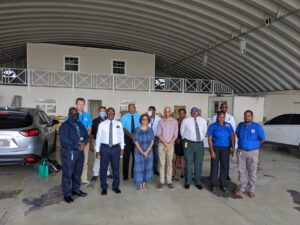DESCRIPTION
Full Title: Exploring the Feasibility and Value of a Regional Network for First Responders (RN4FR) to Reduce Avoidable Disaster Deaths in the Caribbean Region
Short Title: Regional Network for First Responders – Caribbean
Duration: March to September 2022
Principal Investigator: Dr. Nibedita Ray-Bennett (PI) from the University of Leicester.
Collaborators: Mr Errol Maynard (Caribbean Association of Fire Chiefs and Barbados Fire Services (CAFC&BFS)), Professor Peter Jackson (School of Business/University of Leicester), Dr Albrecht Beck (Founder and Director, Prepared International (PPI)), Professor Alois Hirschmugl (Technical Director, Disaster Management Advice and Training (DMAT) Consulting KG), Mr Steve Glovinsky (Founder and President, PeerConnect), Mr David Wales (Shared Aim – UK), Dr Hideyuki Shiroshita (Kansai University, Avoidable Deaths Network (ADN) President), Mr Daniel Mendez (ADN Regional Coordinator-Belize), Mr Krishna Clarke (ADN Regional Coordinator-Barbados, Research Analyst at the Caribbean Development Bank) and Mr Alexander Skinner (ADN Administrator, Second Sect. Communications, Climate and Public Diplomacy, the Foreign, Commonwealth & Development Office, Copenhagen).
Support Members: Ms. Lauren MacLeod (Research Administrator), Mr. Abdullahi O. Umar (Intern) and Ms. Anusha Manahil (Intern).
Context
A particularly pressing area of opportunity for reducing avoidable deaths is to improve the effectiveness of first responders (aka category 1 responders) – emergency services, national and partner country defence agencies, humanitarian non-governmental organisations, private sector organisations and local community leaders and volunteers. Whenever a disaster strikes, first responders are the key actors providing critical assistance to the impacted populations. However, these actors often work within their own domains, neither coordinating or cooperating with their relief work, nor communicating or sharing what they learn from their experiences.
To explore this issue for first responders in the Caribbean region, ADN convened on 10 December 2021 a one-day virtual Symposium on ‘Integrating Disaster Risk Management with Emergency Services and Defence to Reduce Avoidable Disaster Deaths’. The Symposium’s participants agreed on the need to increase collaboration, coordination and communication (3Cs) in national disaster response planning and mitigation efforts among all first responders in the Caribbean region to reduce avoidable disaster deaths and limit the impact on affected populations.
The KE, Impact and Proof of Concept Fund would make it possible to initiate the operationalisation of this conclusion by supporting creation of a Regional Network for First Responders (RN4FR) as a forum for interaction that promotes the 3Cs, and ultimately lead to a unified team-based approach to disaster response across the Caribbean that shortens response times and ensures a well-coordinated relief effort.
The questionnaire and consultations will facilitate the adoption of RN4FR as a full-fledged knowledge-sharing network, and the roadmap will include the identification of the steps and financial resources for its introduction, leading to the realisation of the goal of a unified team-based approach to disaster responses and reduction of avoidable deaths in the Caribbean region.
Aims
The aims of this project are:
- To identify capacity gaps and coordination opportunities for organisations providing first responders in the Caribbean region, through a virtual stakeholder consultation and online questionnaire for exchange of knowledge, experiences and insights.
- To develop a roadmap for the steps needed to address the conclusions of the consultation and online questionnaire, including the creation of the RN4FR, through a stakeholder workshop.
OUTPUT
UPDATES
31 September: A proposal entitled ‘Implementing the Roadmap for a Caribbean First Responders Community (CFRC)’ was submitted to the Caribbean Disaster Emergency Management Agency (CDEMA) for consideration. Awaiting approval.
31 August: End of Project Report submitted to the University of Leicester.
12 July: End of progress report and data analysis are ongoing.
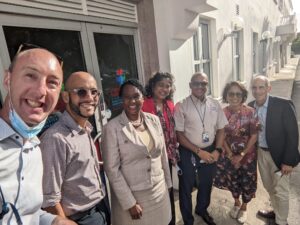
5 July: The second day consisted of 1-1 meetings with Ms. Danielle Toppin, Mr. Peterson Yearwood, Dr. Rochelle Hunte (Barbados Red Cross Society); Ms. Simone Banister (FCDO); Mr. Marlon Clarke (UNDP); Ms. Andria Grosvenor, Captain Robert Harewood and Ms. Joanne Persad (CDEMA). At CDEMA, we learned about the Regional Response Mechanism (RRM) and about building the capacity of the regional training centre. We also explored the opportunity for hosting the communicative space. To end the trip, the RN4FR team continued conversations over dinner at the Radisson Aquatica Hotel with Lieutenant Colonel Jeffrey Forde (RSS), Mr. Errol Maynard (CAFC)/ Barbados Fire Service), Dr. David Byer OBE (QEH-EAS) and Ms. Andria Grosvenor (CDEMA).
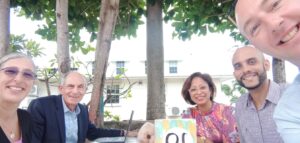
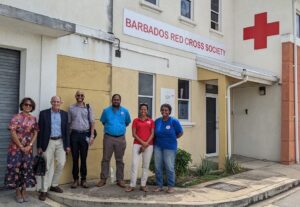
4 July: Dr. Nibedita Ray-Bennett (University of Leicester (UoL)/ ADN), Mr. Alex Skinner (Foreign, Commonwealth & Development Office (FCDO)/ ADN), Mr. Krishna Clarke (Caribbean Development Bank (CDB)/ ADN – Barbados) and Ms. Keisha Linton (Regional Security System (RSS) met with key stakeholders at a Hybrid Meeting at the RSS Airwing at Paragon Base, Barbados to develop a roadmap for the next stage of the RN4FR.
In person attendees included Mr. Graham Archer (RSS), Lieutenant Colonel Jeffrey Forde (RSS), Mr. Errol Maynard (Caribbean Association of Fire Chiefs (CAFC)/ Barbados Fire Service), Mr. Paul Saunders (CDB), Dr. David Byer OBE (Queen Elizabeth Hospital Emergency Ambulance Service (QEH-EAS)), Major Clemens Buter (Pan American Health Organisation (PAHO)), Mr. Peterson Yearwood (Barbados Red Cross Society), Dr. Rochelle Hunte (Barbados Red Cross Society), Mr. Rasheed Pinder (Caribbean Disaster Emergency Management Agency (CDEMA)), Mr. Frank Caswell (World Food Programme) and Mr. Mark Boyce (QEH-EAS).
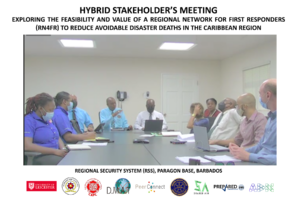
The meeting was attended virtually by Dr. Evangeline Inniss-Springer (University of West Indies Disaster Risk Reduction Centre (UWI-DRRC)), Ms. Simone Ward (Neptune Communications Inc.), Dr. Idelia Ferdinand (Government of St. Vincent and the Grenadines) and Mr. Denver Chiquot (Saint Lucia Fire Service); project Collaborators Professor Alois Hirschmugl (DMAT Consulting KG), Dr. Albrecht Beck (Prepared International PPI), Dr. Hideyuki Shiroshita (Kansai University/ ADN) and Mr. David Wales (Shared Aim); the project Consultant Ms. Nupur Gupta (PeerConnect); the Research Administrator Ms. Lauren Macleod (UoL/ ADN); and project Interns Ms. Anusha Manahil (ADN) and Mr. Abdullahi O. Umar (UoL).
After refreshments, the day continued with 1-1 meetings with Lieutenant Colonel Jeffrey Forde (RSS), Mr. Errol Maynard (CAFC)/ Barbados Fire Service), Mr. Paul Saunders (CDB), Dr. David Byer OBE (QEH-EAS).
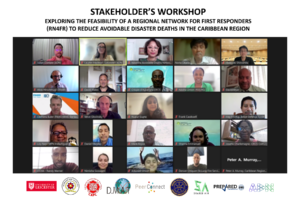
27 June: We held an incredible Stakeholder’s Workshop which welcomed a Keynote Address from Professor Norio Okada (Kyoto University); inputs from an Expert Panel consisting of Dr. David Byer (The Queen Elizabeth Hospital – Barbados Emergency Ambulance Service); Ms. Keisha Linton (Regional Security System); Ms. Priya Thirumur (K1 Britannia Foundation) and Mr. Randy Warner (United Nations OCHA); and Concluding Remarks from Mr. Errol Maynard (Caribbean Fire Chiefs and Barbados Fire Service).
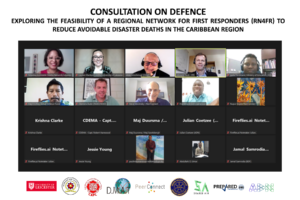
16 June: The third and final Consultation on Defence welcomed 9 brilliant participants from organisations including Belize Red Cross, Netherlands Ministry of Defence in Curacao, Caribbean Disaster Emergency Management Agency (CDEMA), Barbados Defence Force, Government of Cayman Islands, PAHO/ WHO Caribbean, Belize Defence Force and the Government of St. Vincent and the Grenadines.
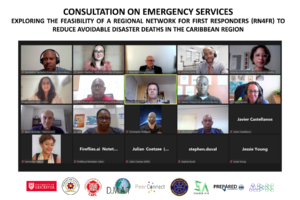
15 June: The second Consultation on Emergency Services welcomed 12 amazing participants from organisations including Belize Red Cross, Trinidad and Tobago Fire Service, Grenada Red Cross, NEMO Belize, Hazard Management Cayman Islands (HMCI), Royal Cayman Islands Police Service (RCIPS), Emergency Medical Services Cayman Islands, Office of Disaster Management (ODM) Sint Maarten and the Saint Lucia Fire Service. The session’s discussion was expertly convened by Dr. David Byer OBE, Head of the Emergency Ambulance Service at the Queen Elizabeth Hospital, Barbados.
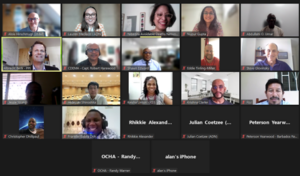
14 June: The first Consultation on Humanitarian Organisations welcomed 16 excellent participants from organisations including K1 Britannia Foundation, Barbados Red Cross, Cayman Islands Red Cross, Belize Red Cross, Caribbean Disaster Emergency Management Agency (CDEMA), United Nations Office for the Coordination of Humanitarian Affairs (UN OCHA) Barbados, Foreign Commonwealth and Development Office (FCDO) Barbados, Belize Defence Force (BDF), Regional Security System (RSS), Trinidad and Tobago Fire Service and Nature’s Love Consultancy Saint Lucia.
13 June: The preliminary findings from the questionnaire have been developed into a 3-page Research Brief which have been shared with the project’s participants in advance of the second stage of data collection, which includes three Consultations with disaster responders in the Caribbean region.
6 June: The questionnaire was closed. Over 21 days, the questionnaire received 71 valid responses from disaster responders in the Caribbean region.
16 May: To commence the data collection phase, the Qualtrics questionnaire went live and was shared with disaster responders in the Caribbean.
12 May: The University of Leicester awarded the project Ethics Approval, allowing us to move into the data collection phase.
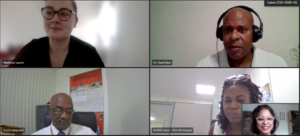
10 May: Dr. Nibedita Ray-Bennett and Ms. Lauren Macleod met with project convenors, Mr. Errol Maynard (Barbados Fire Service & Caribbean Association of Fire Chiefs), Dr. David Byres (Queen Elizabeth Hospital Emergency Ambulance Service) and Ms. Keisha Linton (Regional Security System).
26 March: Dr. Nibedita Ray-Bennett held the second Collaborators Meeting to discuss the e-Discussion. Attendees included Dr. Hideyuki Shiroshita, Mr. Krishna Clarke, Professor Alois Hirschmugl, Mr. Steve Glovinsky, Ms. Nupur Gupta and Ms. Lauren Macleod.
25 March: Dr. Nibedita Ray-Bennett held the first Collaborators Meeting to orientate the project collaborators with the project and initiate the first steps. Some of the attendees including Mr. Steve Glovinsky, Ms. Lauren Macleod, Ms. Nupur Gupta, Professor Alois Hirschmugl, Dr. Hideyuki Shiroshita, Mr. Abdullahi O. Umar and Ms. Anusha Manahil.
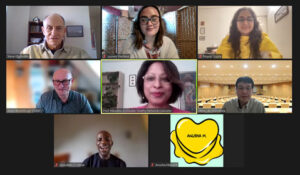
24 March: Dr. Nibedita Ray-Bennett and Dr. Hideyuki Shiroshita met with the project Champion, Mr. Errol Maynard of the Barbados Fire Service and the Caribbean Association of Fire Chiefs to discuss preliminary actions. They were joined by Collaborators Mr. Steve Glovinsky (PeerConnect) and Professor Alois Hirschmugl (DMAT Consulting KG); Consultant Ms. Nupur Gupta (PeerConnect); Research Administrator Ms. Lauren Macleod (University of Leicester/ ADN); and Interns Ms. Anusha Manahil (ADN) and Mr. Abdullahi O. Umar (University of Leicester).
PRESS

University Researchers Meet Disaster Responders In Barbados
BARBADOS TODAY
Click here to read the article

